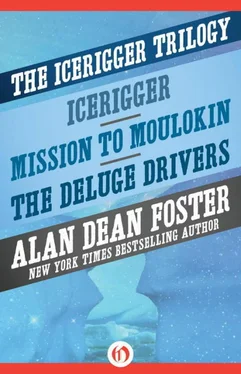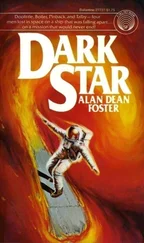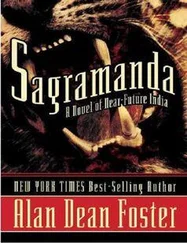“Merchant families,” Trell corrected him, “not island states. But the effect would be the same. Personally, I don’t feel that’s necessary. The present commercial arrangements are satisfactory to all concerned. Unless you think someone other than myself can supervise our trade better.”
“I too, find the existing understandings agreeable.”
They fell silent then, each absorbed in furious thinking while ostensibly concentrating on the construction which continued below them. Noisy crews raised the first new wall, bracing the unfamiliar prestressed plastic against the wind. Once it was molded in place, the work could proceed rapidly behind the windbreak it would provide.
“What then is to be done, friend Trell? Can you yourself do nothing?”
“I’m afraid not, my friend. I can conceal credits and crates and alter listings and manifests. Three citizen corpses would be dangerous to try and make disappear. Yet we must do something… and not clumsily visible, this time.
“These three humans are strangers to Arsudun, but not to your world, Landgrave. They have lived among the Tran for many months. They are intelligent. Their grasp of your language and nuances is firmer than that of my own specialists. While I am informed that a union such as they contemplate is extremely unlikely, they should not be given the opportunity to prove my xenologists wrong. They should be discouraged.”
“Discouraged,” echoed the Landgrave, mimicking the human vowels as best he could. “But not here. I understand. As soon as they are fairly on their way, I will muster the best arguments at my disposal.”
“I’m sure they’ll be effective.”
Both turned back to watch as the second wall was raised into place and the human engineers commenced heat-sealing the corner where they joined. Nothing more was mentioned about the Slanderscree ’s crusading crew. Nothing more needed to be. While they were of different races, they understood one another perfectly…
“What do you know about this Poyolavomaar?” Ethan held onto a shroud as he spoke to Ta-hoding. They were making their laborious way southward from Arsudun harbor, tacking into a stiff breeze.
“Only what the other captains on the icefront told me, friend Ethan. Four stars to port!” Responding to his command, the two burly helmsmen fought to turn the huge wooden wheel. A screeching sound slightly higher than usual came from the stern of the immense icerigger as the fifth duralloy runner, used to steer the vessel, cut sideways into the ice. Slowly the ship came around to a new heading.
For several days now they had been racing parallel to the island of Arsudun. They’d already covered, by Williams’ estimates, over a hundred kilometers. It was evident that Arsudun was many, many times the size of Sofold, Hunnar and Ta-hoding’s home island.
The lowlands around the city and harbor had long since given way to cliffs which rose steeply from the ice to heights of thirty meters or more. Trees and shrubs grew to the edge of the cliffs, forming an uneven fringe at their tops, making the weaving cliffline resemble the spine of a nervous green cat.
“You told me,” Ta-hoding went on, “we should begin our quest with some nearby yet important state. All of the captains and merchants I talked to agreed that Poyolavomaar was the most powerful in this region save Arsudun itself. It sounds like an interesting city to visit.”
Safely clear of other ships, Ta-hoding was feeling conversational. “According to Zho Midan-Gee, the captain who was most helpful to me, Poyolavomaar is a cluster of ten or more closely grouped and very steep islands. He said they are so near to one another that all but the very youngest cubs can safely chivan from one to the next. Having made two trips there himself in past years, he most remembers that these islands form a circle, enclosed island to island by great walls much like the one which protects our own harbor at Wannome.”
“It sounds very much like a place that could develop into a center of commerce,” Ethan admitted.
Ta-hoding made a gesture of agreement. “Trade is the most important business there, Midan-Gee told me. If the walls all have gates, a captain could take his ship out of the enclosed harbor in any direction he chose, without worrying about where he would pick up a trailing wind.
“Still we must remember that many of these captains produce much of their own wind,” Ta-hoding said portentously, blithely excluding himself from the company of ice-going prevaricators. “They like to boast of their abilities and expertise. This Poyolavomaar may be nought but a cluster of metal-poor villages. Yet I think Midan-Gee as honest as most and am inclined to trust him.”
“We have to trust someone,” Ethan reminded him.
Ta-hoding studied the setting sun. The thermonuclear candle was almost straight ahead, its flaming upper curve beginning to settle beneath the martingale of the ship. He glanced down at something set just behind the great wheel.
“According to compass, Ethan, we have been changing heading from south to southwest for the past two hours.” He gestured at the land mass of Arsudun, which was still to port. Only now port had become north instead of west.
“We have rounded the southernmost part of the island,” Ta-hoding continued. “As the winds on the open ice will become stronger and the day is almost done, with your permission I would suggest anchoring for the night.”
“You’re the captain, Ta-hoding. This ship is your charge. Do what you think best.”
“Thank you, Sir Ethan.” The portly Tran moved forward of the wheel, leaned over the helmdeck railing and shouted forward. Sailors turned immediately to listen. Ta-hoding was deferential and meek in private conversation. But when giving orders to his crew, he made certain his words were audible above the wind.
“Kilpit, Monslawic!” Two mates acknowledged. “Reef in all sails and prepare to anchor!”
These orders were voice-relayed back down the ship to the last sailor at the bowsprit. Each crawled his way up into the rigging. Once more Ethan marveled at the ability of the Tran sailors, who constantly had to set, adjust, and take in sails while walking on narrow spars in a perpetual gale.
When all the sheets were furled and the icerigger had come to a near halt, the fore and aft ice anchors were released. These clusters of metal thorns and spikes were usually set into a heavy globe of cast iron. Those of the Slanderscree gained additional holding power from the chips and shards of duralloy gleaned from the remnants of the cannibalized lifeboat in which Ethan and his friends had crashed.
There were nerve-tingling shrieks and crackings as the anchors snubbed themselves deeply into the ice fore and aft. The ship slipped slowly to the west, shoved by the persistent wind, until the pika-pina cables holding the anchors grew taut. The creaking and groaning ceased. The Slanderscree had come to a halt.
Immediately, blocking teams went over her side. They secured the ship by placing stone slabs in front and behind each of the five runners. Now the ship would not move unless struck by an abnormal wind. Guards at stern and bow were posted more to warn of such an approaching weather front than of any flesh-and-blood peril.
Ethan remained on deck, watching the last glow of sunlight shift steadily from yellow to red to purple.
“Not hungry, friend Ethan?”
Startled, his head jerked around. Yellow-framed black slits set in a furry face glowed back at him, flaming with sunset light.
“Not right now, Hunnar.” He turned back to lean on the railing and stare out across the ice. Tran-ky-ky’s two moons had risen. There was little snow or ice in the air tonight and just enough stratus cloud to mark the difference between atmosphere and deep space. Moonlight knocked double shadows off the trees clinging tenaciously to nearby cliff edges. The ice ocean itself had lost its daytime harshness, lay hard and unmoving while cloaked in ethereal blue-white moon glow.
Читать дальше










